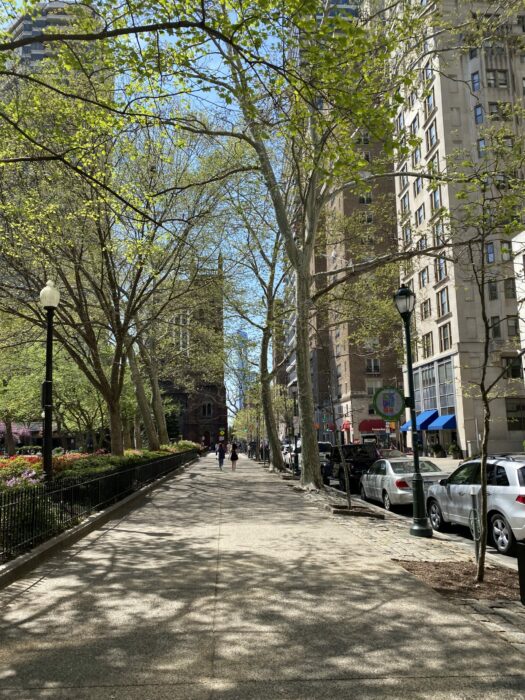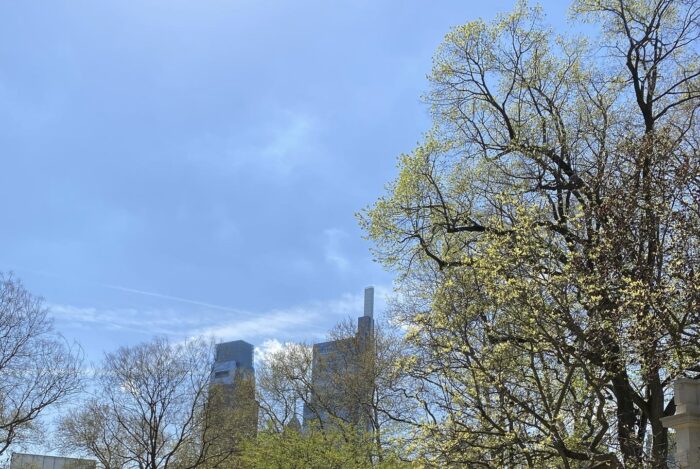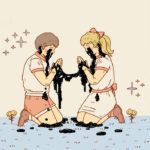Cultivate, Maintain, Wander Through Nowhere: The Wonder Years and ‘The Hum Goes on Forever’
Posted: by The Alt Editing Staff

I liked to listen to The Hum Goes on Forever, the new album by The Wonder Years, and walk around Rittenhouse. Always a little too loud, I’d weave through the leashes of wealthy dog owners and squeeze through the narrow paths between cramped farmer’s market stands; I’d excuse myself to wary waiters serving outdoor bistro diners and I’d give wide berths to unaware tourist groups in town for company retreats. I’d circle around daily canvassers (sorry) and occasionally pluck out my earbuds to watch the jazz performers or celebrity impersonators do their thing at the center of the square. I listened to “Summer Clothes” at least ten times in front of the Barnes & Noble where I often parked my bike and used the free bathroom (RIP). I listened to “Low Tide” and “Laura and the Beehive” while loitering around the softer, shadier streets, just trying to wipe off the sweat and give myself a break from the sun. I sat on the brick structures that mark the entrance to the square and I let the record’s final moments burst and fade while I made lists in my journal.
On this, their seventh album, The Wonder Years do not appear drastically changed from when we last heard from them (with 2018’s Sister Cities). Here, they still deal in crunching guitars and hooky choruses. I would personally still say that they make pop-punk music, a little sharp and caustic around the edges but fully determined to get you singing along. The band doesn’t seem interested in taking any wild risks at this point in their career — if you’ve been familiar with The Wonder Years at any point in the last decade, it’s likely that most of the songs on The Hum Goes on Forever will strike you as firmly in their wheelhouse. They’ve got a bouncy, ecstatic crowd-mover (“Wyatt’s Song”); they’ve got a richly detailed anthem to their hometown (“The Paris of Nowhere”). There are clamorous, self-reflexive rock songs shouting out in regret (“Cardinals II,” “Old Friends Like Lost Teeth”) and there’s a sweeping gut-wrencher of a closer (“You’re The Reason I Don’t Want The World to End”).
One might understand how the band’s latest record can come off a little rote. Compared to Sister Cities, which embraced a stormier aesthetic adorned with chillier electronics, all of which seemed to be reaching for a more capital-R Rock vibe, Hum swings back around to the warmer, less fussy aspects of their sound circa Suburbia or The Greatest Generation. Here, The Wonder Years simply do not reinvent the wheel that is a Wonder Years song (with some exception maybe given to the dour, heavy sound of “Songs About Death”). If you’re looking for that kind of drastic revision here, which is not an unreasonable hope, you might be disappointed in The Hum Goes on Forever.
And my critic’s brain is sympathetic to that perspective — I too want my favorite bands to reinvent themselves with abandon. I want my favorite bands to do what Low did on Double Negative and HEY WHAT, to completely turn themselves inside out and see what happens; I want them to do what The Promise Ring did on Wood/Water or even what Lorde did on Solar Power, reimagine themselves as something completely different, even when the results are not perfect or even really successful at all.
But when I’m sitting on the freshly upgraded benches in Rittenhouse Square, or hanging around the comfortable cement surfaces outside some silent Center City church, or riding a weaving bike through South Philly Saturday night parties and past familiar neighborhood friends, arms raised just at the last possible moment before I am gone, I am not concerned with these criticisms. I’m nodding my head in all the chaos, closing my eyes in the solitude. I am singing, in motion.

I have always listened to The Wonder Years in the midst of too much motion, too much noise. To “Everything I Own Fits in This Backpack” on a dark shuddering bus with a hood on over my head. I lost my voice to “A Raindance in Traffic” on a blistering, nervous drive across Florida’s belt and I mourned to “Pyramids of Salt” as my boots crunched and smushed through ugly frigid slush, my body shivering and stumbling while my mind was on another planet.
For me, these have always been loud and desperate rock songs to live with, and Dan Campbell has always made pop-punk a home for the heavier parts of being alive. Even in the late ‘00s and early ‘10s, when dick jokes and fast-food grease often seeped from the hearts of their wordy and rousing anthems, The Wonder Years wrote songs about feeling crushed and outmatched by the world. They found a way to channel an intensity of feeling that emerges from the most regular of days, from the ever-circling memories of former friends and former selves.
That world-moving feeling that the average Wonder Years song seems to reach for — so interested they have been over the years of (maybe clumsily) defining a generation or stretching an experience to a (maybe imaginary) notion of universality — is the essence of what emo music does, what it can do (and don’t genre-police me on this), whether it lands successfully or not. In the wrong light, this grandiosity can be hard to swallow. In the best conditions, though, it can mean the world.
This self-seriousness — an element of the band that crept in around the conceptual ambition of 2011’s Beats-indebted Suburbia and fully coalesced around the dire spirit of 2013’s The Greatest Generation, only increasing in potency since then — is actually toned down a tad on The Hum Goes on Forever. While the world is still ending in these songs, a newfound looseness gives the band a welcome sense of levity.
In “Low Tide,” for instance, the urgency of personal catastrophe is balanced by a kind of silly shrug of a chorus: “I’m growing out my hair / ‘cause who gives a shit?” “The Paris of Nowhere” is a classic pop-punk love song to Philadelphia, offering celebratory nods to football stars and flooding rivers and old friends. And at the heart of the album is “Summer Clothes,” a breezy acoustic number that gorgeously sketches the cool, sensory relief of nostalgia: “The AC is busted, it’s hotter than hell / But I hate myself a little less / When the salt air hits my skin.” Here, The Wonder Years take care to carve out space for joy and for gratitude — take the celebratory hook to single “Wyatt’s Song “ or the balmy, patient ode to protection in “Laura and the Beehive” — without sacrificing the honest confrontations with fear and anxiety and depression that have always made this band special.
Those confrontations take on new dimensions and complexities this time around. The Hum Goes on Forever is very clearly an album informed by parenthood. Since the release of Sister Cities in 2018, Campbell has become a father of two, and this development anchors the new record in ways both experiential and existential — the crevices of these songs are filled with tiny gloves and the first mumblings of new words. A newfound sense of responsibility pulses through the record, a sense of anxiety about stepping up to the plate as a parent: “I’ve never been so afraid of failing at anything,” Campbell shouts in “Wyatt’s Song.”
While the visceral reality of parenthood undergirds The Hum Goes on Forever, I think it might be more accurate to say that this is an album about care, about that strange and difficult negotiation between self-preservation and keeping others afloat. The experience of parenthood brings this negotiation into sharper relief, but really this is a conflict that the band has been interested in exploring for a while now.
Take “Cardinals II” as evidence of this thematic consistency. In this sequel to the 2015 No Closer to Heaven single, the band returns to the subject of a lost friend, amplifying the intensity and the guilt of this nightmare of the past. While the first iteration of this story read like a promise to set things right (“if you call me back or let me in / I swear I’ll never let you down again”), “Cardinals II” attempts to face the guilt and untangle the shame of this perceived failure, in part through the process of finding common ground: “I know the feeling when the light begins to fade.” When the song’s final admission erupts in a cacophony of dark and urgent sound, it’s still one of regret (“I fucked it all up”). But all drawn out and rising from the noise, it sounds like release, acceptance.
The notion here is one that might seem obvious — that you need to take care of yourself, forgive yourself for your past mistakes, if you ever want to take proper care of the ones you love. That punishing your mind and your body will never save the world. But The Hum Goes on Forever navigates and exposes the difficulty of building these truths into your life — from “I don’t wanna die / or maybe I do” to “I hear you laughing in the afterglow / all the reasons to abandon all my former ghosts.” It’s a subtle change that happens through a document of harsh admissions and painful self-examinations, but also joyful shouts of devotion. It happens by making detailed lists and revisiting past lives. By doing the work.
I fell in love with these songs among the tourists and the artists cluttering the wide sidewalks around Rittenhouse. They made the most sense to me when I was out in the world, letting the music fill in the cracks between my everyday tasks, between me and all the people going about their business.
This kind of listening waned and waxed between deeply distracted and intensely focused. Between ecstatic and exhausted. I wandered through these spaces and these songs without a real purpose, just trying to center myself through this aimless, stretched-out summer, one during which I struggled to keep my feet firmly planted, during which I worked to understand that I was coming to an intersection really of several streets, some of them great big emotional highways and some of them dinky little cobblestone roads. I felt a little chaotic but also at the same time so little was actually happening. I paused the music and listened to a group of folks in their 70s argue about the worth of frozen fruit and the cultural acceptance of “kleenex” as a term for tissues on the bench across from me. I pressed play again and kept scribbling in my journal while the guitars sawed at my brain, still too loud to be healthy.
Something about the way that The Wonder Years address the pain and the dread has always connected with me more than I think I’ve fully understood. The way that Campbell gives us as much of the messy truth as he can — the breakdowns in the other room, the exhaustion of anticipated disaster, the fear that things just might not get better this time — juxtaposed with the band’s harsh, world-muting take on a pop song has always connected with me on a visceral, gut-spinning level.

This is particularly true at the moments when I have struggled to be completely honest with myself. That feeling that this band can deliver — no matter how imaginary and outlandish, that the world is on your shoulders and it’s crumbling because you can’t hold it up — is a real feeling that you can’t get rid of unless you do the work to put it to rest. It’s that feeling that you get when you’ve lost touch with a friend who needed you once. When a loved one is dying and you’re a world away. When the world is ending and you have a family to keep safe.
I think what makes The Hum Goes on Forever especially compelling in this light is the way that it pushes beyond that honesty and into the grueling effort of untangling these dire feelings. In the fiery “Lost in the Lights,” Campbell reflects on the repercussions of a past self quick to destruction: “when I was 17 I wrote a song about how I’m drinking kerosene / I’ll be coughing up embers for decades to come.” “Songs About Death” examines the toll of exposing all this pain and grief to the world for years on end.
And of course there’s “You’re the Reason I Don’t Want the World to End,” which puts to rest some of the notions that prevailed earlier in the band’s career, these ideas about “beating” depression and anxiety and dread with aggression and sheer force of will. “Put the work in / plant a garden / try to stay afloat,” Campbell sings, an endorsement of a hard-won truth: taking care of yourself is a messy, imperfect, lifelong effort that takes an impossible amount of patience. There will always be new dimensions and new complications to being alive, and you’ll always have to cultivate and maintain new ways of living and thriving through them.
Wandering around Philadelphia this summer, that so-called “Paris of nowhere,” low and lonely and a little bit lost, I needed to hear it once — “I know all the people in my dreams are just me / they’re all telling me what I know already” — I needed to hear it again — “I’m gonna dig you out / I’m gonna dig you out” — I needed to hear it over and over — “put the work in / plant a garden.” I needed to hear it ring on forever.
_
Jordan Walsh | @jordalsh
The Alternative is ad-free and 100% supported by our readers. If you’d like to help us produce more content and promote more great new music, please consider donating to our Patreon page, which also allows you to receive sweet perks like free albums and The Alternative merch.










